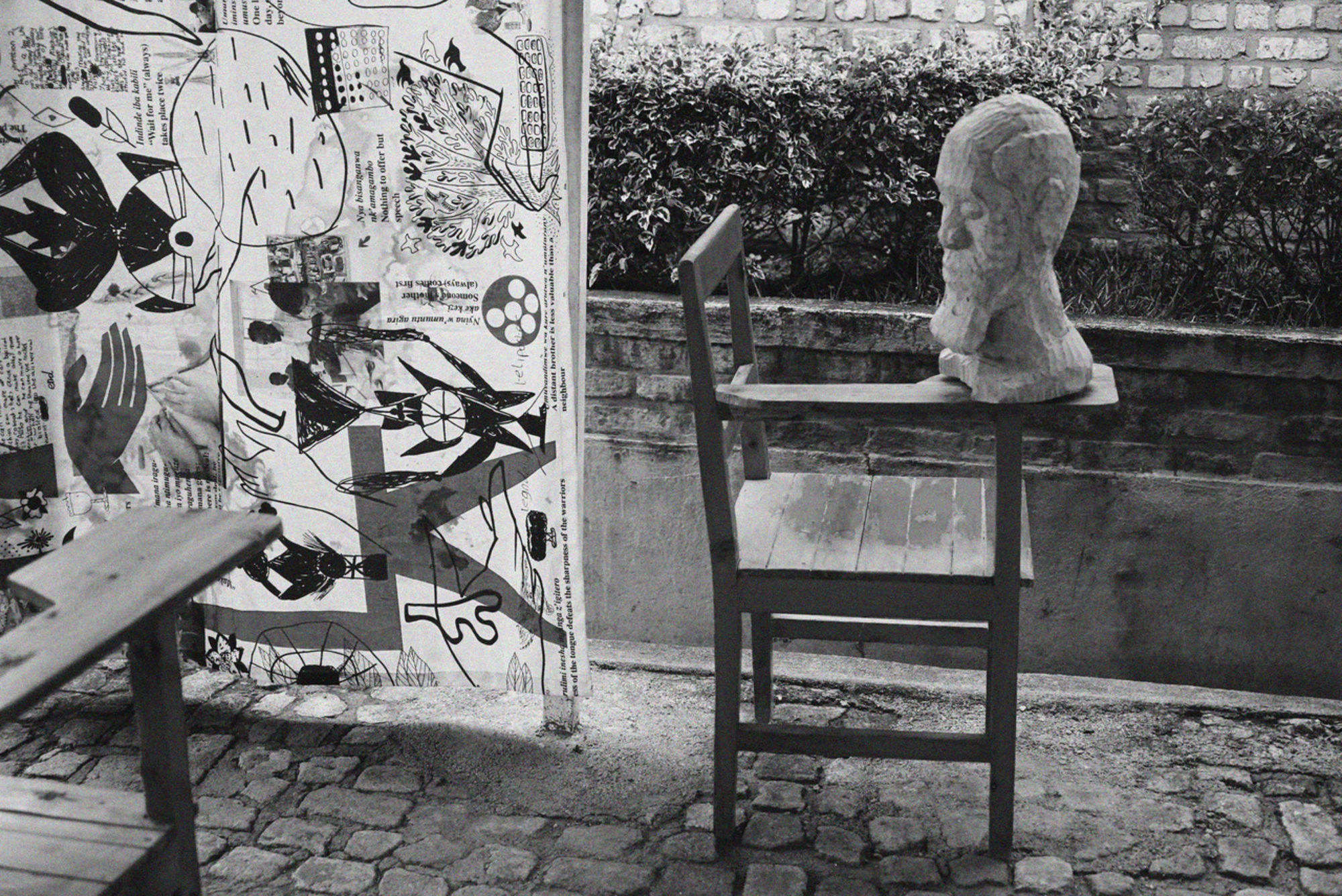An Evening with Philosopher Isaïe Nzeyimana, in Dialogue with Anthropologist Natacha Nsabimana and Artist Christian Nyampeta
Wed, Oct 23, 2019, 6:30pm
Christian Nyampeta, École du soir, at former Nile Polytechnic of Applied Arts, in the context of Another Roadmap School International Meeting, Huye, August 2018.
Considered from the global conditions that marked the last twenty-five years in the Great Lakes of East Africa, philosopher Isaïe Nzeyimana contends that only those who have something in common can engage in conflict. In this sense, even among the most antagonistic forces, this thought inaugurates a relation of inclusive disjunction. Such conjunctive relationships put pressure and perhaps even outdate notions of the Other and its corollary, Identity.
In this colloquium Nzeyimana outlines his major preoccupations in history, economy and education, as he attempts to think “Africa” at once in its geographic unity and in its historical contradictions. His seminar will be followed by insights drawn from his reflections on the pedagogical models he has practiced: the now-closed Nile Source Polytechnic of Applied Arts—a BA-level institution with programs in translation, graphic design, architecture and environmental studies in Huye, a semi-rural city in Rwanda; and École Doctorale, a mobile school that offers doctoral programs borne of cooperations between industries and universities, and whose low-resident candidates are each placed in two universities located in various regions of the African continent and beyond.
Nzeyimana’s presentation will be followed by reflections from Chicago-based Anthropologist Natacha Nsabimana, drawing from her research and studies on the everyday aftermath of violence, examining how such violence occupies the landscape and the kinds of individual and societal narratives such memory allows and disavows.
The colloquium ends with a panel discussion moderated by New York-based artist Christian Nyampeta. Nzeyimana’s thought is global in scope: How to understand life in its unity, in its essential indivisible propriety? How to build a memory of present-day limits of living, one and indivisible? How to layer the memories that are sometimes contradictory, even though they are all true? How to reconcile the singular national and official memory with the multiple individual and collective memories? The colloquium hopes to contribute to the question of how to live together in the history of the present.
This colloquium is in conjunction with École du soir (The Evening Academy), Christian Nyampeta’s exhibition at SculptureCenter, on view through December 16.
This program is off site at e-flux, located at 311 E Broadway. The program is free and open to the public on a first come, first served basis. For more information, contact program@e-flux.com.
Sponsors
École du soir (The Evening Academy) is made possible with financial support from the Mondriaan Fund, the public cultural funding organization focusing on visual arts and cultural heritage. Additional support is provided as part of the Dutch Culture USA program by the Consulate General of the Netherlands in New York.
Lead underwriting support of SculptureCenter’s Exhibition Fund has been generously provided by the Kraus Family Foundation with additional support by Toby Devan Lewis.
SculptureCenter’s programs and operating support is provided by the Lambent Foundation Fund of Tides Foundation; public funds from the New York City Department of Cultural Affairs in partnership with the City Council; the New York State Council on the Arts with the support of Governor Andrew M. Cuomo and the New York State Legislature; the National Endowment for the Arts; Danielle and Drew Anderman; Andreas Beroutsos and Abigail Hirschhorn; Carol Bove and Gordon Terry; Irene and Allen Brill; Laren C. and Jesse M. Brill; Lee and Robert K. Elliott; Elizabeth and Adrian Ellis; Fred Wilson; the A. Woodner Fund; New York City Council Member Jimmy Van Bramer; and contributions from our Board of Trustees and Director’s Circle. Additional funding is provided by the Milton and Sally Avery Arts Foundation and contributions from many generous individuals.



